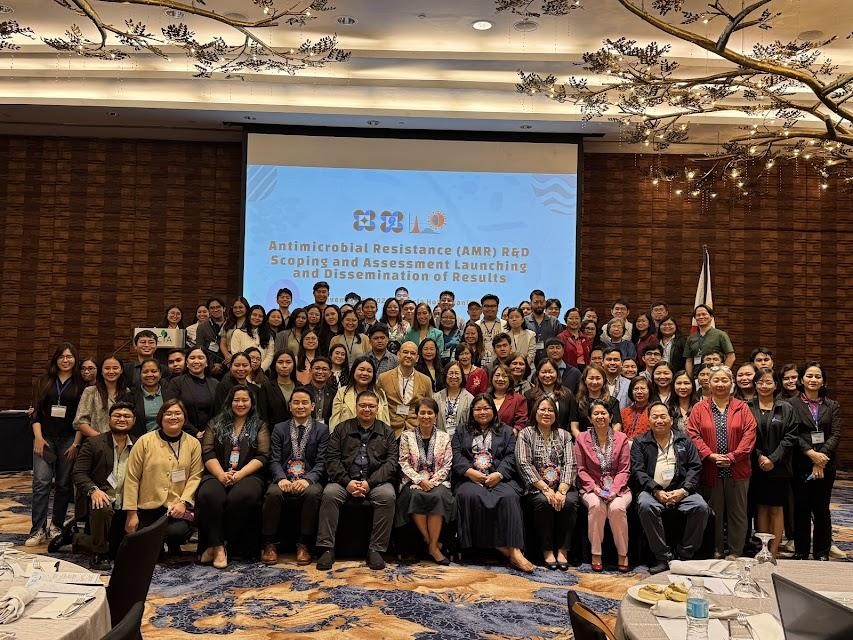NEWS AND UPDATES
Tackling Antimicrobial Resistance: DOST-PCHRD Advances AMR R&D Efforts

Antimicrobial resistance (AMR) continues to pose a growing public health threat, requiring actionable solutions rooted in research. On 5 November 2024, the Department of Science and Technology – Philippine Council for Health Research and Development (DOST-PCHRD) convened over 100 stakeholders for the Antimicrobial Resistance (AMR) R&D Scoping and Assessment Launching and Dissemination of Results. Attendees from government agencies, research institutions, and healthcare sectors gathered to share insights, discuss findings, and strategize to combat AMR.
Dr. Leah J. Buendia, DOST Undersecretary for Research and Development, highlighted the value of science-driven solutions in addressing AMR. “The fight against antimicrobial resistance is a global responsibility. Through R&D, we can develop science-based interventions to protect health for generations,” she stated.
The presentation of the National AMR R&D Scoping and Assessment by S&T Fellow Dr. Karell Jo Angelique C. Calpito provided an overview of the research situation in the Philippines. The report detailed resources, organizational efforts, and areas requiring attention, offering a guide for decisions and research directions. “This study identifies where research efforts can be aligned for greater focus and impact,” Dr. Calpito explained.
Three studies under DOST-PCHRD’s Re-emerging and Emerging Diseases (RED) Program highlighted diverse approaches to combating AMR. Dr. Fema M. Abamo of Mindanao State University – Marawi shared the “Inter-Regional Network through One Health Approach to Combat AMR (1NET)” program, focusing on coordinated AMR surveillance across human, animal, and environmental sectors. Dr. Sharon Yvette Angelina M. Villanueva from the University of the Philippines – Manila discussed the “One ARM Program,” which explores bacterial resistance in the Greater Manila Area, including interconnections between healthcare settings, communities, and the environment. Mr. Mark B. Carascal of The Medical City introduced the “SkIn PaTCH Project,” a study examining the potential of phage therapy to address skin infections caused by multidrug-resistant bacteria.
Policy discussions further underscored the AMR response. Dr. Fides Maria Aileen V. Buenafe from the Department of Health highlighted the contributions of the Philippine National Action Plan on AMR and the Inter-agency Committee on Antimicrobial Resistance (ICAMR). She outlined current efforts and the value of sustained collaboration. Adding a global lens, Mr. Juan Paolo Tonolete of the World Health Organization reaffirmed the organization’s support for the Philippines in advancing AMR mitigation efforts.
In closing, Ms. Guidditta L. Gelera, Senior Science Research Specialist of DOST-PCHRD, called for sustained engagement to address AMR. “The findings presented here demonstrate progress while identifying areas that require further attention. Continued commitment to research across human, animal, and environmental health is necessary for long-term success,” she remarked.
The event concluded with remarks from DOST-PCHRD Executive Director Dr. Jaime C. Montoya, who emphasized that addressing antimicrobial resistance requires constant vigilance and renewed dedication. He noted, “This event represents a step forward in aligning R&D priorities with local and global health needs. Research provides the foundation for sustainable solutions that respond to the issues posed by AMR.”
For more information on the Philippine Antimicrobial Awareness Week, visit https://pharma.doh.gov.ph/paaw-2024/.
Footnote:
The event was organized by the RED Team: Guidditta L. Gelera, Maica Ann Eugenio-Talag, Marfil Forteza, Renmar Joseph Gutierrez, Laureanna Caoctoy, Anna Alliah Calonzo, Kristine Matibag, and Dr. Karell Jo Angelique Calpito.




